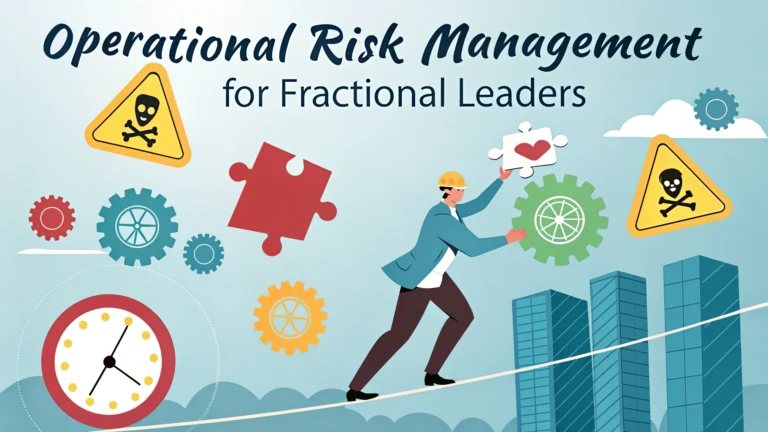Risk management becomes uniquely challenging when leading multiple organizations as a fractional executive.
Fractional COOs must develop specialized approaches to identify, assess, and mitigate risks across different business contexts and industries simultaneously.
This guide outlines practical strategies for fractional leaders to effectively manage operational risks while maintaining high performance standards across multiple client organizations.
Key Risk Areas for Fractional Leaders
- Time Management Risks: Balancing commitments across multiple clients
- Knowledge Transfer Risks: Ensuring continuity of operations
- Compliance Risks: Meeting varied regulatory requirements
- Communication Risks: Managing multiple stakeholder relationships
- Quality Control Risks: Maintaining consistent standards
Risk Assessment Framework
Start each client engagement with a thorough risk assessment using this practical framework:
| Risk Category | Assessment Questions | Mitigation Strategies |
|---|---|---|
| Strategic | What are the critical business objectives? | Document clear success metrics and milestones |
| Operational | What are the key process vulnerabilities? | Implement standardized operating procedures |
| Financial | What are the resource constraints? | Establish clear budget controls and monitoring |
Practical Risk Mitigation Strategies
- Documentation Systems
- Use cloud-based documentation platforms
- Create standardized templates for processes
- Maintain detailed handover documents
- Communication Protocols
- Set clear availability schedules
- Establish emergency contact procedures
- Use project management tools for transparency
Technology Tools for Risk Management
Recommended tools for fractional leaders:
- Asana or Monday.com – Project management and workflow tracking
- DocuSign – Secure document handling
- Slack – Real-time communication
- Google Workspace – Collaborative documentation
Building Resilient Systems
Implement these foundational elements in each client organization:
- Clear delegation structures
- Documented escalation procedures
- Regular risk review meetings
- Backup personnel assignments
- Emergency response plans
Insurance and Legal Considerations
Protect your practice with these essential coverage types:
- Professional Liability Insurance
- Errors and Omissions Coverage
- Cyber Security Insurance
- General Business Liability
Moving Forward with Confidence
Regular risk assessments and proactive management strategies enable fractional leaders to deliver consistent value across multiple organizations.
Contact professional organizations like the Fractional Leadership Network (https://fractionalleadership.org) for additional resources and support.
Schedule quarterly risk management reviews to ensure your risk mitigation strategies remain effective and up-to-date.
Performance Monitoring and Metrics
Establish key performance indicators (KPIs) specific to risk management across organizations:
- Risk incident frequency rates
- Resolution time metrics
- Compliance audit scores
- Stakeholder satisfaction ratings
- Process efficiency measurements
Cross-Organization Knowledge Sharing
Best Practices Implementation
- Create risk management playbooks
- Document lessons learned
- Share anonymized case studies
- Develop risk response templates
Training and Development
- Regular team training sessions
- Risk management workshops
- Scenario planning exercises
- Leadership development programs
Crisis Management Planning
Develop comprehensive crisis response frameworks:
- Initial Response
- Immediate action protocols
- Stakeholder communication templates
- Emergency contact procedures
- Recovery Planning
- Business continuity measures
- Resource allocation strategies
- Service restoration priorities
Empowering Risk-Resilient Leadership
Success in fractional leadership requires a balanced approach to risk management that enables growth while protecting organizational assets. Implement these strategies systematically, regularly assess their effectiveness, and adapt them to meet evolving business needs.
Remember that effective risk management is not about eliminating all risks but about making informed decisions that support sustainable business growth across multiple organizations.
Stay connected with industry peers, maintain professional certifications, and continue building your risk management expertise to ensure long-term success in your fractional leadership role.
FAQs
- What are the key operational risks that fractional leaders need to manage?
Core operational risks include team alignment, communication gaps, data security, process consistency, resource allocation, compliance oversight, business continuity, and stakeholder management across multiple client organizations. - How can fractional COOs effectively implement risk management strategies across multiple organizations?
Fractional COOs should establish standardized risk assessment frameworks, develop client-specific risk matrices, implement digital collaboration tools, maintain clear documentation, and create scalable monitoring systems that work across different organizational contexts. - What are the unique compliance challenges faced by fractional leaders?
Fractional leaders must navigate multiple regulatory environments, ensure consistent policy implementation across different organizations, maintain confidentiality between clients, and stay updated with industry-specific compliance requirements for each client. - How do fractional leaders handle business continuity planning?
They develop modular continuity plans that can be adapted to each client, establish clear delegation protocols, maintain comprehensive documentation, and create backup systems for critical processes and knowledge transfer. - What role does technology play in operational risk management for fractional leaders?
Technology enables remote monitoring, automated risk assessments, secure data sharing, process automation, real-time reporting, and efficient communication across multiple organizations while maintaining security and compliance. - How can fractional COOs manage team-related risks across different organizations?
They implement clear communication protocols, establish role definitions, create accountability frameworks, develop cross-training programs, and maintain consistent performance monitoring systems across all client organizations. - What are the best practices for data security when working across multiple organizations?
Implementing separate secure communication channels, using encrypted data storage, maintaining strict access controls, establishing clear data handling protocols, and regularly auditing security measures for each client organization. - How do fractional leaders measure and report risk management effectiveness?
Through establishing KPIs for risk management, regular risk assessment reviews, incident tracking systems, performance metrics monitoring, and creating standardized reporting frameworks that work across different organizational contexts. - What strategies help fractional leaders maintain consistent risk management across different organizational cultures?
Developing adaptable risk frameworks, understanding each organization’s risk appetite, creating culture-specific communication approaches, and implementing flexible yet standardized risk management processes. - How should fractional COOs handle crisis management across multiple organizations?
By developing scalable crisis response plans, establishing clear communication channels, maintaining emergency contact protocols, and creating client-specific escalation procedures while ensuring consistent crisis management approaches.







